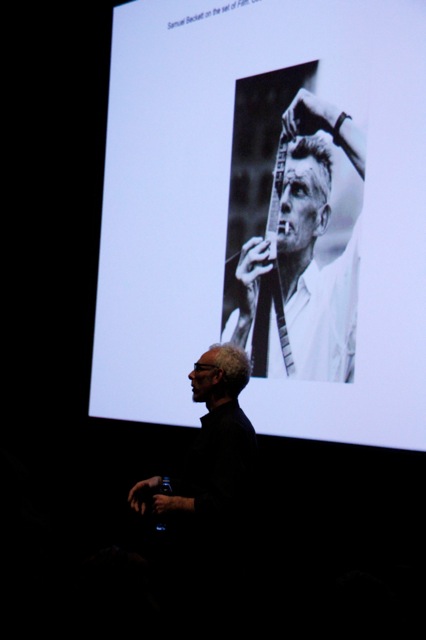WCMC-Q Professor Speaks at Major Art Retrospective in Dublin
November 2010

Beckett's approach to movie making reflects a
time of experimentation in film and is important
to consider in order to fully appreciate his work,
Sharkey explains to a full house in Dublin's
Irish Museum of Modern Art.
Rodney Sharkey, Ph.D., assistant professor of writing at WCMC-Q and noted scholar of Anglo-Irish literature, contextualized a rare screening of Samuel Beckett’s 20-minute movie “Film” for a full house at the Irish Film Institute in Dublin. The screening formed part of the Irish Museum of Modern Art’s first-ever major retrospective of modern Irish artists.
To build the exhibit, entitled "The Moderns-Cinema and Ireland,” museum curators gathered work from all over the world out of private collections, Sharkey says. Beckett’s “Film” was chosen as a representative example of Irish modern visual art and Sharkey, a frequent publisher on Beckett, struck curators as the obvious choice to illuminate “Film.”
“This exhibition exposes people in Ireland now to a tradition of modernist visual art they didn't know existed,” Sharkey said. “That’s why the talks were useful, because they bring some much needed context and dialogue to the art itself.”
Sharkey says that 1964, the year when Beckett made “Film,” was a time when artists took a more experimental approach to movie making. The techniques were deliberate and the audience more open to directors’ editorial choices as part of the films themselves—but this has changed as people are now inundated with movies based on repeated themes and styles.
“It’s an indictment of our contemporary culture,” Sharkey says, “that an awareness of cinematic form is almost absent because we’ve gotten so used to a type of cinema that doesn’t require any investment by the viewer into how the film is put together.”
Whether he’s serving as an expert at a major public exhibition or as a professor in the lecture hall at WCMC-Q, Sharkey imparts and emphasizes context around art and literature as a fundamental way of interpreting it to the fullest. He pushes his students at WCMC-Q past a formulaic approach to literature and says this contributes to their critical thinking and research skills.
“There’s this sort of pattern that students learn in primary school that they think they can get away with when they discuss a piece of writing,” he says. “So immediately I’m asking questions like “Who? What? Where? When? Why?” and they discover the author’s background, how that period differs from the modern period; they learn all these interesting intersections of ideas and have more to say. They learn about good research.”
By Emily Alp
Photo by Tara Slye
